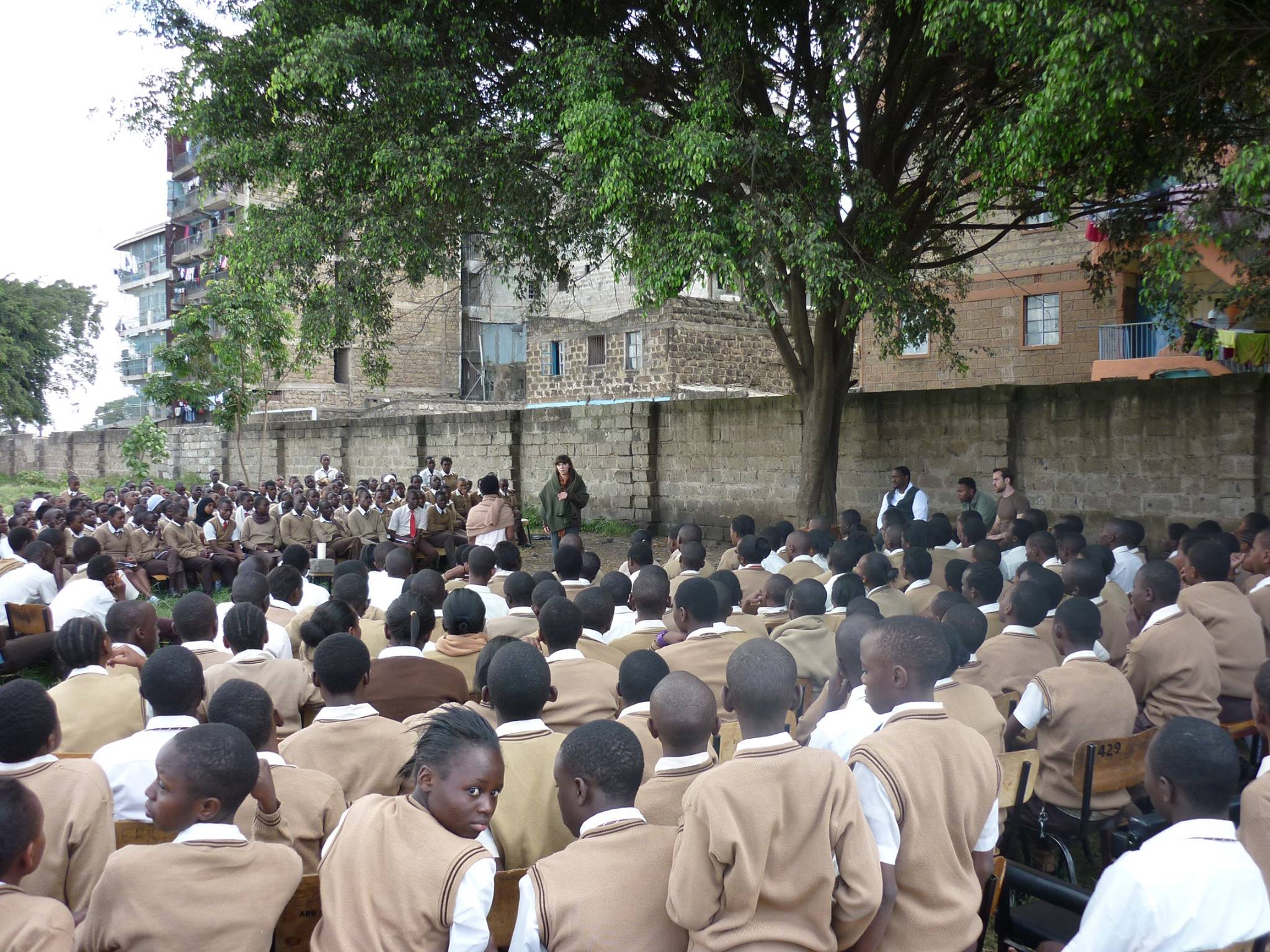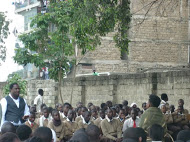
On the road to our next school things start going pear-shaped.
We’re passing through Eastleigh into Huruma when a police officer waves us to the side of the road. James, our driver, eases over, and the cop knocks on the window, asking to see our passports. The Americans in the van dutifully hand over folded up photocopies, which the embassy has told us to carry at all times. “This is a photocopy,” the officer says, blinking at the white paper and confirming to himself the supremely obvious. “Do you have your actual passports?” Nobody does.
The officer sets to arguing with James and with Simon, the sound man on our film crew. The Americans in the car, myself included, are forced to search for our near fates in the emotional tenor of the conversation until two English words leap out: “Police Station.”
We all briefly wonder what it’s like to be arrested in Kenya.
Simon even slides over to make room for the cop to come with us.
But next thing we know the officer is waving us on. Seems he’d been on the phone and learned the actual regulations regarding foreign passports. We breathe a sigh of relief.
And then James rolls over a bed of nails.
The damage is immediately apparent in the hissing tires off the left side. James forces the van up over the sidewalk and onto a dusty verge – dragging, as usual, the low undercarriage on the concrete (every speed bump we pass comes with a horrible squeal of scraping metal).
Walter and Van 2 park a few yards in front us. Thankfully he’s carrying a spare as well, so we’ve got what we need to replace both shredded tires. Peter, Marcel, Lunga, Simon, and James crouch down and get to work. For all the commotion, we’re out of there in ten minutes, curling back onto the road in search of the entrance to the school, when a concussive pop and a chorus of groans tell the tale of yet another blow-out.
“It’s not us. It’s not us,” Marcel says. “It’s the bus.” Sure enough, to our relief and to the passengers’ misfortune, it is a nearby bus that’s just blown a tire, and we’ve still got all the rubber we need.
We turn off the main road and wander the narrow corridors of the Huruma slum, stopping frequently to ask for directions to a school no one seems to have heard of (possibly, it turns out, because we had the name wrong). At last we arrive at Ndururuno Secondary School, the Headmistress, Faith, greeting us at the gate.
The show itself is our best yet. We perform outdoors under the shade of a large tree growing against the wall of the schoolyard. We have an audience of 400 high school students arranged in a rather Greek configuration. Peter later remarked on how unsurprising the success ought to have been: the play was written to be performed outside, after all. The whole cast seemed to make the most of the setting. Mark, for example, says near the end of the play, “there’s nothing left. Just smoke. Not even smoke.” Ordinarily, he does this while blowing out a candle on the altar. But for this performance, the candle would not stay lit, so instead, when it came to the end, he pointed to a billowing black cloud rising over the slum beyond the schoolyard.
Benita snapped a great photo of neighborhood kids peeking over the wall to see the action.
The response after the show was tremendous. Peter led the talkback today by having each actor introduce themselves and their character – “Hi, I’m Mark. I played the Chorus, and I wanted to negotiate between the rule of my king and the gods.” Then they asked how many students, by show of hands, agreed with them. Poor Kea got a big thumbs down for “who thinks Ismene was right?” Phumi, naturally, saw a great deal of support for Antigone. But the most raucous applause was saved for Marcel: “I played the Guard. And I just wanted to live my life in peace.”
Fascinating answers to the more nitty-gritty questions as well. Margaret agreed with Kreon “because he ruled with his heart and all he wanted was to protect the city.” A young man shot back, saying “ruling with your heart requires compromise for those you love.” Bethany stood for Antigone: “we have to protect traditions even despite the law.”
Alianda, one of the fourth-years, made a very perceptive comment on Kreon’s position. He noted that though Antigone and Tiresias call the king foolish for punishing a man who is already dead, Polynices’ influence may live on after his personal death. If his body receives tolerance, it will be received as a sign to those who still think to challenge the kingdom.
It was difficult to board the vans again and depart with so many smart, eager students crowding around to talk. But after a small gathering for tea and cake generously offered by the faculty at Ndururuno, we rolled through the gates and back onto the road.
-Steve Foglia


